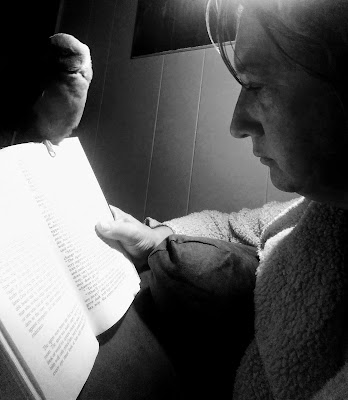Here is Bach's Cantata BMW 169 "Gott soll allein mein Herze haben"
Once again, Josh and I visited the pet store for fish and came home with two Lovebirds. Someone needed to re-home and now they're mine. Meet Toot and Puddle. I named them after two favorite characters in a series of children's books I used to read to my son when he was little. In the book, Toot and Puddle are pigs, but Puddle surprises Toot with a birthday present and guess what? It's a parrot! I believe those stories are what sparked my desire in getting my own feathered babies.
 Rosemary: The Hidden Kennedy Daughter by Kate Clifford Larson
Rosemary: The Hidden Kennedy Daughter by Kate Clifford LarsonMy rating: 3 of 5 stars
The true life tragedy of Joe and Rose Kennedy's oldest daughter.
Rosemary was a beautiful child, but by the time of her adolescence, her parents realized that she was not developing normally. As it was customary to do back then, she was institutionalized. However, this was not enough for her father, Joe Kennedy. He decided that she needed to be improved in order to fit in with his super-achieving brood of future politicians and movers and shakers in the world.
Rosemary ended up getting a lobotomy. Whatever limited mental and emotional skills she might have had were obliterated.
Larson's moving biography details the birth and life of Rosemary Kennedy, starting with her parents, how they met and the traumatic birth of their first daughter. She takes us step by step through Rosemary's childhood, adolescence, young adulthood and eventual confinement inside an institution. Ironically, she outlived most of her family.
Larson exposes the ignorance towards people with special needs and the lack of resources. And this is where her biography shows not just a tragedy but how humans rise above personal sorrow and adversity. One of Rosemary's sisters as well as her brother Jack became determined to change the living conditions and standards for people like their sister Rosemary. They initiated charitable organizations, contributing thousands of dollars to provide help for others with similar challenges.
Their sister Rosemary was shut away and hidden. A secret to be ashamed of. Thanks to siblings and also nieces and nephews, others won't have to suffer a similar fate.
Larson does a credible and interesting job of not only informing us of this least known member of the Kennedy clan but also provides a good amount of information of the other Kennedy siblings and her parents. No one is one dimensional. Some of them acted in despicable ways, especially her father and her mother could at times be selfish, but Larson also shows when they were capable of compassion. Some of their actions were simply because they were risen in a certain time period that was steeped in ignorance towards the mentally challenged, emotionally disturbed, or mentally ill. Even the author, Arthur Miller, institutionalized his son who had Down's Syndrome.
All in all a pretty comprehensive job of recording a time period, a famous family and, most significantly, an under-reported member of that family.
View all my reviews

Window shopping and catching some Jazz players jamming it up Saturday night, in New Orleans, last Labor Day weekend.

























